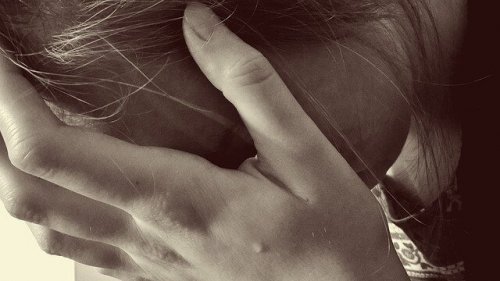A Breakup Doesn't Mean You Failed

Breakups tend to be painful for everyone involved. However, when you’re on the receiving end, it can be even more difficult for you because you didn’t get a chance to decide. Consequently, you might interpret the breakup as a failure on your part and feel a sense of destructive guilt. But you should know that a breakup doesn’t mean you’ve failed.
This feeling of personal failure is heightened if a third person is involved in the breakup. It’s nearly impossible not to compare yourself to the other person, which will definitely make you feel worse. All that being said, the question is: do you have to feel worthless when someone breaks up with you? Let’s delve deeper into this.
A breakup doesn’t mean you’ve failed, especially if you were genuinely committed to the other person.
Breakups are painful
Why does it hurt so much when someone breaks up with you? It makes sense that ending a relationship is painful, especially if it wasn’t your decision and you still want to be with the other person. Nevertheless, many things come into play in a breakup. That’s because you change in very intimate ways when you’re part of a romantic couple.

When you choose a partner, you don’t do so at random. Something about the other person draws you to them. You feel deeply connected, so you decide to have a relationship with them. At that moment, you let them see your must vulnerable side with the hope that they’ll respond in kind.
If everything goes well and you decide to date, you’ll transition to the honeymoon phase. This doesn’t just happen after you get married, it also happens at the beginning of a relationship. During this phase, you’re so enamored with the other person that you admire them and everything they do. You feel like you’ve found your “soulmate“.
The honeymoon period, when you first fall in love with someone, can be so magical that it’s completely disconcerting when the relationship ends. You don’t know what to do with your emotions and you desperately look for ways to stay together. You might even resort to behaviors that show that you don’t value yourself enough.
There are a lot of factors that influence how you act. However, most of them stem from a terrible fear of being alone. Most of us have irrational beliefs about love. When we feel alone, we feel empty inside and scared because we don’t know what to do with that feeling. Sometimes, that leads you to do things that only harm you in the long run.
Why do you feel empty?
The emptiness you feel when someone leaves you comes from the idea that you need another person to feel fulfilled. That, however, is a serious mistake. If you think that way, you’re putting far too much responsibility on the other person. Your fulfillment is only up to you and no one else.
When you start to depend on other people to feel good about yourself, you lay a bad foundation for your relationship. One thing is to feel good with your partner, but it’s another thing entirely to depend on them to feel good. If you put yourself in that position, you’ll feel vulnerable and insecure. Those two things can put even the healthiest relationship on the path to destruction.
If you want to create a mature and conscious relationship, you need two complete people. The relationship isn’t a joining together of two incomplete people. It’s like dancing the tango. Both of the dancers have to know their role, one can’t depend on the other to take the next step. When you put the movements together, though, you see a harmonious dance that delights everyone.
Likewise, the secret to a lasting relationship is that both partners should maintain their individual identities. They shouldn’t become someone else just because they’re in a relationship. Both partners have to take responsibility for their actions, in addition to giving what they can do the other. Both people can love each other intensely and genuinely, but in the way that satisfies them the most.
A breakup doesn’t mean that you necessarily did something wrong. Maybe you did, maybe you didn’t. The most important thing is that the relationship doesn’t stop you from being who you truly are.

If you truly invest yourself in the relationship, breaking up doesn’t mean you failed
If you truly give the relationship your all, you’ll feel more connected to the other person. Not only that, but your actions will reflect what you’re thinking and feeling. Love, in that case, becomes much purer. However, it’s really hard to get to this point because we tend to be afraid that our partners will make fun of us, hurt us, or leave us.
If you want to stop being afraid, you have to understand that a breakup isn’t the worst thing in the world. The biggest failure isn’t the breakup in and of itself. It’s investing time in a relationship that isn’t making you happy or holding back because you’re scared.
If you were fully and authentically invested in a relationship, you gave it your all, and your partner left you anyway, that doesn’t mean that you failed. Why not? Because you were fully involved and committed. In other words, the simple fact of being in the relationship was enough of a reward because it was what you really wanted. You didn’t do it because you were scared of being alone. That’s a win, not a failure.
A breakup doesn’t mean you failed if you gave it your best try.
We shouldn’t judge couples based on how long they’ve been together, or whether or not they stayed together. If the other person wasn’t able to be as involved in the relationship as you were, maybe they failed. Or maybe you simply weren’t compatible. In either case, your value as a person doesn’t change. This breakup doesn’t mean you failed because you did your best at the end of the day.
“What we once enjoyed and deeply loved we can never lose. All that we love deeply becomes a part of us.”
-Helen Keller-
Breakups tend to be painful for everyone involved. However, when you’re on the receiving end, it can be even more difficult for you because you didn’t get a chance to decide. Consequently, you might interpret the breakup as a failure on your part and feel a sense of destructive guilt. But you should know that a breakup doesn’t mean you’ve failed.
This feeling of personal failure is heightened if a third person is involved in the breakup. It’s nearly impossible not to compare yourself to the other person, which will definitely make you feel worse. All that being said, the question is: do you have to feel worthless when someone breaks up with you? Let’s delve deeper into this.
A breakup doesn’t mean you’ve failed, especially if you were genuinely committed to the other person.
Breakups are painful
Why does it hurt so much when someone breaks up with you? It makes sense that ending a relationship is painful, especially if it wasn’t your decision and you still want to be with the other person. Nevertheless, many things come into play in a breakup. That’s because you change in very intimate ways when you’re part of a romantic couple.

When you choose a partner, you don’t do so at random. Something about the other person draws you to them. You feel deeply connected, so you decide to have a relationship with them. At that moment, you let them see your must vulnerable side with the hope that they’ll respond in kind.
If everything goes well and you decide to date, you’ll transition to the honeymoon phase. This doesn’t just happen after you get married, it also happens at the beginning of a relationship. During this phase, you’re so enamored with the other person that you admire them and everything they do. You feel like you’ve found your “soulmate“.
The honeymoon period, when you first fall in love with someone, can be so magical that it’s completely disconcerting when the relationship ends. You don’t know what to do with your emotions and you desperately look for ways to stay together. You might even resort to behaviors that show that you don’t value yourself enough.
There are a lot of factors that influence how you act. However, most of them stem from a terrible fear of being alone. Most of us have irrational beliefs about love. When we feel alone, we feel empty inside and scared because we don’t know what to do with that feeling. Sometimes, that leads you to do things that only harm you in the long run.
Why do you feel empty?
The emptiness you feel when someone leaves you comes from the idea that you need another person to feel fulfilled. That, however, is a serious mistake. If you think that way, you’re putting far too much responsibility on the other person. Your fulfillment is only up to you and no one else.
When you start to depend on other people to feel good about yourself, you lay a bad foundation for your relationship. One thing is to feel good with your partner, but it’s another thing entirely to depend on them to feel good. If you put yourself in that position, you’ll feel vulnerable and insecure. Those two things can put even the healthiest relationship on the path to destruction.
If you want to create a mature and conscious relationship, you need two complete people. The relationship isn’t a joining together of two incomplete people. It’s like dancing the tango. Both of the dancers have to know their role, one can’t depend on the other to take the next step. When you put the movements together, though, you see a harmonious dance that delights everyone.
Likewise, the secret to a lasting relationship is that both partners should maintain their individual identities. They shouldn’t become someone else just because they’re in a relationship. Both partners have to take responsibility for their actions, in addition to giving what they can do the other. Both people can love each other intensely and genuinely, but in the way that satisfies them the most.
A breakup doesn’t mean that you necessarily did something wrong. Maybe you did, maybe you didn’t. The most important thing is that the relationship doesn’t stop you from being who you truly are.

If you truly invest yourself in the relationship, breaking up doesn’t mean you failed
If you truly give the relationship your all, you’ll feel more connected to the other person. Not only that, but your actions will reflect what you’re thinking and feeling. Love, in that case, becomes much purer. However, it’s really hard to get to this point because we tend to be afraid that our partners will make fun of us, hurt us, or leave us.
If you want to stop being afraid, you have to understand that a breakup isn’t the worst thing in the world. The biggest failure isn’t the breakup in and of itself. It’s investing time in a relationship that isn’t making you happy or holding back because you’re scared.
If you were fully and authentically invested in a relationship, you gave it your all, and your partner left you anyway, that doesn’t mean that you failed. Why not? Because you were fully involved and committed. In other words, the simple fact of being in the relationship was enough of a reward because it was what you really wanted. You didn’t do it because you were scared of being alone. That’s a win, not a failure.
A breakup doesn’t mean you failed if you gave it your best try.
We shouldn’t judge couples based on how long they’ve been together, or whether or not they stayed together. If the other person wasn’t able to be as involved in the relationship as you were, maybe they failed. Or maybe you simply weren’t compatible. In either case, your value as a person doesn’t change. This breakup doesn’t mean you failed because you did your best at the end of the day.
“What we once enjoyed and deeply loved we can never lose. All that we love deeply becomes a part of us.”
-Helen Keller-
This text is provided for informational purposes only and does not replace consultation with a professional. If in doubt, consult your specialist.







